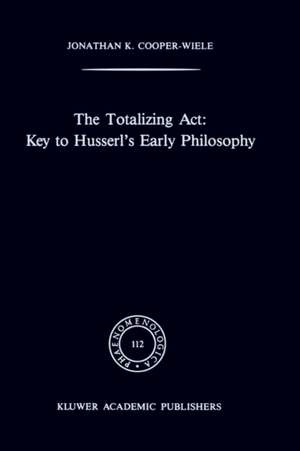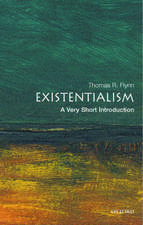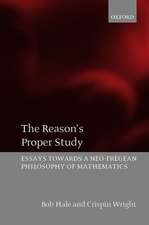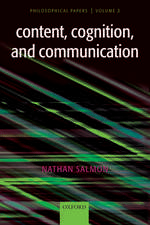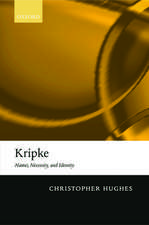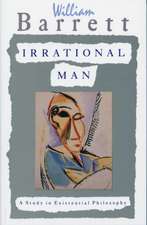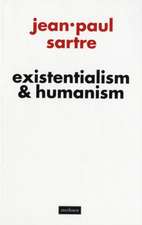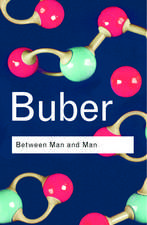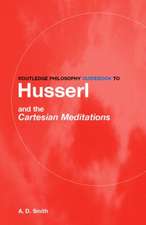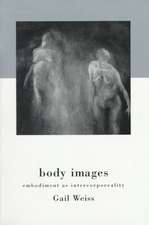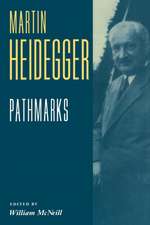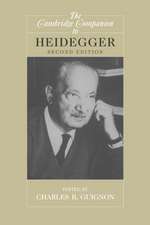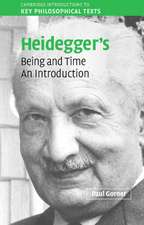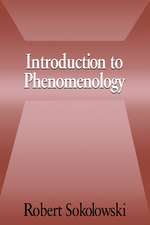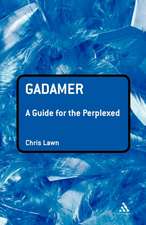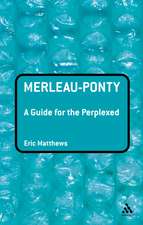The Totalizing Act: Key to Husserl’s Early Philosophy: Phaenomenologica, cartea 112
Autor J.K. Cooper-Wieleen Limba Engleză Hardback – 31 mar 1989
| Toate formatele și edițiile | Preț | Express |
|---|---|---|
| Paperback (1) | 938.34 lei 6-8 săpt. | |
| SPRINGER NETHERLANDS – 3 oct 2013 | 938.34 lei 6-8 săpt. | |
| Hardback (1) | 944.19 lei 6-8 săpt. | |
| SPRINGER NETHERLANDS – 31 mar 1989 | 944.19 lei 6-8 săpt. |
Din seria Phaenomenologica
- 20%
 Preț: 816.33 lei
Preț: 816.33 lei - 13%
 Preț: 478.40 lei
Preț: 478.40 lei - 20%
 Preț: 629.12 lei
Preț: 629.12 lei - 13%
 Preț: 491.46 lei
Preț: 491.46 lei - 13%
 Preț: 542.55 lei
Preț: 542.55 lei - 20%
 Preț: 553.67 lei
Preț: 553.67 lei - 15%
 Preț: 633.02 lei
Preț: 633.02 lei -
 Preț: 417.02 lei
Preț: 417.02 lei -
 Preț: 417.90 lei
Preț: 417.90 lei -
 Preț: 418.29 lei
Preț: 418.29 lei -
 Preț: 389.49 lei
Preț: 389.49 lei -
 Preț: 425.42 lei
Preț: 425.42 lei - 15%
 Preț: 577.72 lei
Preț: 577.72 lei - 15%
 Preț: 527.32 lei
Preț: 527.32 lei - 15%
 Preț: 636.80 lei
Preț: 636.80 lei - 18%
 Preț: 952.89 lei
Preț: 952.89 lei - 18%
 Preț: 949.42 lei
Preț: 949.42 lei - 15%
 Preț: 643.65 lei
Preț: 643.65 lei - 18%
 Preț: 1225.48 lei
Preț: 1225.48 lei -
 Preț: 389.31 lei
Preț: 389.31 lei - 18%
 Preț: 1113.39 lei
Preț: 1113.39 lei - 18%
 Preț: 952.40 lei
Preț: 952.40 lei - 18%
 Preț: 1713.67 lei
Preț: 1713.67 lei - 18%
 Preț: 1551.73 lei
Preț: 1551.73 lei - 18%
 Preț: 1222.31 lei
Preț: 1222.31 lei - 15%
 Preț: 642.51 lei
Preț: 642.51 lei - 18%
 Preț: 1112.78 lei
Preț: 1112.78 lei - 18%
 Preț: 891.80 lei
Preț: 891.80 lei - 18%
 Preț: 948.47 lei
Preț: 948.47 lei - 18%
 Preț: 1224.18 lei
Preț: 1224.18 lei - 18%
 Preț: 946.87 lei
Preț: 946.87 lei - 15%
 Preț: 578.84 lei
Preț: 578.84 lei - 15%
 Preț: 464.18 lei
Preț: 464.18 lei - 18%
 Preț: 839.56 lei
Preț: 839.56 lei
Preț: 944.19 lei
Preț vechi: 1151.45 lei
-18% Nou
Puncte Express: 1416
Preț estimativ în valută:
180.67€ • 188.63$ • 149.53£
180.67€ • 188.63$ • 149.53£
Carte tipărită la comandă
Livrare economică 04-18 aprilie
Preluare comenzi: 021 569.72.76
Specificații
ISBN-13: 9780792300779
ISBN-10: 0792300777
Pagini: 150
Ilustrații: X, 150 p.
Dimensiuni: 156 x 234 x 11 mm
Greutate: 0.41 kg
Ediția:1989
Editura: SPRINGER NETHERLANDS
Colecția Springer
Seria Phaenomenologica
Locul publicării:Dordrecht, Netherlands
ISBN-10: 0792300777
Pagini: 150
Ilustrații: X, 150 p.
Dimensiuni: 156 x 234 x 11 mm
Greutate: 0.41 kg
Ediția:1989
Editura: SPRINGER NETHERLANDS
Colecția Springer
Seria Phaenomenologica
Locul publicării:Dordrecht, Netherlands
Public țintă
ResearchCuprins
Introduction: The Origins of Husserl’s Totalizing Act.- I. The Totalizing Act: Key to Husserl’s Early Philosophy.- The Totalizing Act.- The Totalizing Act as Totality.- II. The Concept of the Totalizing Act as Collective Connection: Progenitor of Number.- The Auto-Abstraction of the Concept of Collective Connection.- Number Concepts: Progeny of the Totalizing Act.- The “Attachment” of Number Concepts: Index of the Totalizing Act.- The Preeminence of the Totalizing Act: Refutation of a Prevalent Interpretation.- III. Symbolizing: Prosthesis of the Totalizing Act.- The Hierarchic Complication of Totalizing Acts.- The Anatomy of Abstracta.- The Self-Extension of the Totalizing Act by Proxy.- IV. The Symbolic Totalization of Sensible Multitudes.- The Sensible Individual as Modified Multitude.- The Symbolic Totalization of the Sensible Multitude.- V. The Intuitive Totalization of the Individual Sense Object.- The Sensible Group: Sufficient Context for Analyzing Intuition of Individuals.- The Problem: Non-Convertibility of Simultaneous and Successive Totalizing.- The Resolution: Successive and Simultaneous Totalizing as Continuous.- The Mutual Implication of Intuiting and Representing in the Intuition of the Sensible Thing.- VI. The Totalizing Act as Mediator of the Ideal and Real.- Hypothesis: The Internal Motivation for the Great Inversion.- Confirmation: The Prolegomena of 1900.- VII. The Ensoulment of Sensation: Triumph of the Totalizing Psyche.- The Immanent Object as Empiricistic Fetish.- The Psychical Production of the Transcendent Object.- The Dilemma: The Uncertainty of the Transcendent and the Imperceptibility of the Immanent.- The Great Reversal: The Causal World as Interpretation.- Afterword: A Hypothetical Answer for Alfred Schutz.- Appendices.- SelectedBibliography.
